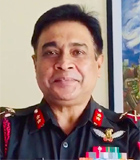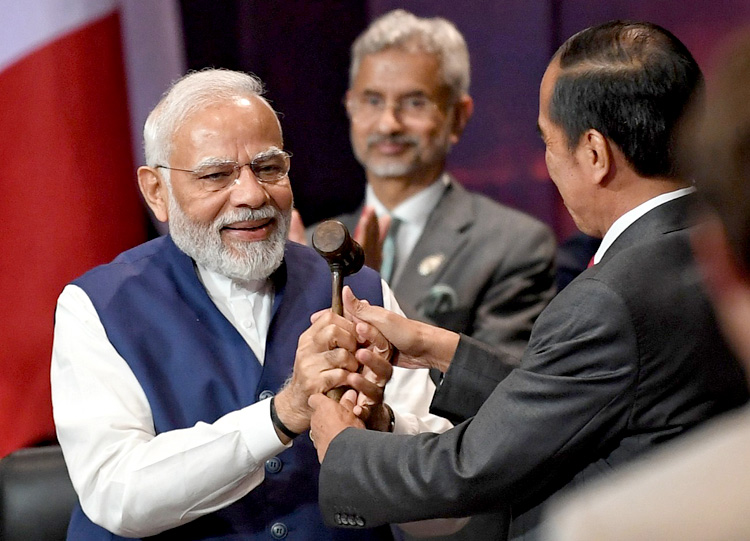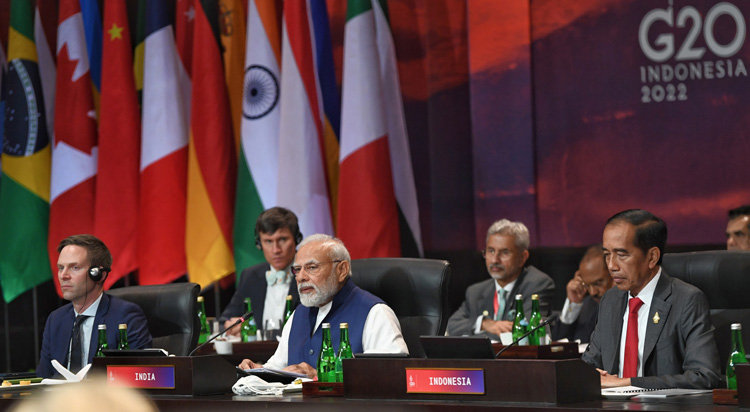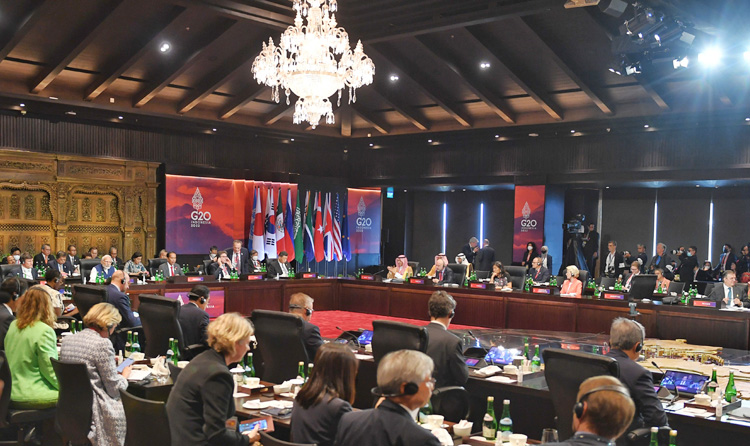INDIAN ARMED FORCES CHIEFS ON OUR RELENTLESS AND FOCUSED PUBLISHING EFFORTS

The insightful articles, inspiring narrations and analytical perspectives presented by the Editorial Team, establish an alluring connect with the reader. My compliments and best wishes to SP Guide Publications.

"Over the past 60 years, the growth of SP Guide Publications has mirrored the rising stature of Indian Navy. Its well-researched and informative magazines on Defence and Aerospace sector have served to shape an educated opinion of our military personnel, policy makers and the public alike. I wish SP's Publication team continued success, fair winds and following seas in all future endeavour!"

Since, its inception in 1964, SP Guide Publications has consistently demonstrated commitment to high-quality journalism in the aerospace and defence sectors, earning a well-deserved reputation as Asia's largest media house in this domain. I wish SP Guide Publications continued success in its pursuit of excellence.
- Operation Sindoor: Resolute yet Restrained
- India’s Operation Sindoor Sends a Clear Message to Terror and the World – ‘ZERO TOLERANCE’
- Japan and India set forth a defence cooperation consultancy framework, talks on tank and jet engines
- Terrorist Attack in Pahalgam in Kashmir: Unfolding a long surgical war against PAK
- Lt General Pratik Sharma takes over Command of Indian Army's Northern Command
G20: Prospects Beyond Summits
The presidency gives India a unique opportunity to steer the agenda, showcase its leadership acumen and brandish its rich cultural and archaeological heritage
 |
The Author is former Chief of Staff of a frontline Corps in the North East and a former helicopter pilot. He earlier headed the China & neighbourhood desk at the Defence Intelligence Agency. He retired in July 2020 and held the appointment of Addl DG Information Systems at Army HQ. |

They say that there is no other place like Bali in this world. A magical blend of culture, people, nature, activities, weather, culinary delights, nightlife, and beautiful accommodation. So, if the G20 summit held barely weeks back on November 15-16, left the global leaders gathered there euphoric and heady, self-congratulatory in tone and tenor, one can not fault them. Leaders love photo-ops, away from the dreary business of running their countries and counties.
Meanwhile, the war in Ukraine continues to rage, with millions facing the brunt of sub-zero temperatures as Russia pummelled its electric and energy grids with missiles and drones. Countries across the world struggle to balance budgets after stiff rise in energy, food, and fertiliser prices largely because of the war in Ukraine as also a breakdown of the global supply chains that shows no signs of return to normalcy since the COVID crisis of February 2020.
Though a rotational and routine turn, the presidency is being heralded as an achievement of sorts, a befitting recognition of a rising India
The other enduring crisis, climate change, remains largely unaddressed or may even be in regression as German Chancellor Olaf Scholz's coalition, reeling from eight-fold increase in gas prices due to the war, gave the green light at the end of June to restart 27 coal-fired power plants until March 2024. Just to remind the readers, pledges were made in another gleaming summit in Glasgow COP26 in November 2021 urging countries to phase down coal and fossil-fuel subsidies. Some signed on to an initiative to help developing countries, such as India and South Africa, transition away from coal. Twenty-five countries and five financial institutions committed to stop public financing for most fossil fuel projects by the end of 2022. The EU's coal consumption rose by 10 per cent in the first six months of 2022, according to the International Energy Agency.

As India assumes presidency of G20, there is palpable excitement in the air. Though a rotational and routine turn, the presidency is being heralded as an achievement of sorts, a befitting recognition of a rising India. A controversy erupted when its logo was unveiled since it had Lotus, the national flower of India but also the BJP election symbol, as its defining feature. The opposition saw red. The PM convened a meeting of the opposition leaders across the spectrum to emphasise that G20 presidency was a unique national opportunity, not for the governing dispensation but for the country.
The first sherpas conclave was held in opposition Congress-ruled Rajasthan, as if to blunt the criticism. From being greeted at the Udaipur airport by musicians in dazzling traditional attire to an opportunity to try on "safas" or the colourful Rajasthani turbans and jackets with delicate hand-embroidered patterns, several unique cultural experiences formed an integral part of the arrangements made for the foreign diplomats and officials. The hard-nosed discussions on global economic challenges and climate change which would form the bedrock of future deliberations by leaders were cloaked in the softer hues of Indian culture.
A grouping as important as this would give India a chance to push global concerns
The presidency gives India a unique opportunity to steer the agenda, showcase its leadership acumen and brandish its rich cultural and archaeological heritage. Together, the G20 accounts for more than 80 per cent of world GDP, 75 per cent of global trade and 60 per cent of the population of the planet. A grouping as important as this would give India a chance to push global concerns, especially reshaping the governance of global finance, increasing the lending capacity of the IMF to tackle situations like the Sri Lankan crisis and push a practical and pragmatic climate agenda. Even highlighting the right issues serve their purpose, notwithstanding severe limitations in imposing the declaration key points on member nations.
The timing of India assuming presidency is pivotal. The Ukraine war has thrown up many unintended but significant consequences. By weaponising institutions like the Bank for International Settlements (BIS) or mechanisms like the Society for Worldwide Interbank Financial Telecommunication (SWIFT), providing services related to the execution of financial transactions and payments between banks worldwide, the west has injected doubts on reliability of such global systems or institutions to remain neutral to geopolitical upheaval. So, countries and groupings are scurrying to latch onto alternative mechanism or worst, isolate. This decoupling is also happening in the sphere of reserve currency where the US dollar has been ruling the roost since the fall of Great Britain Pound in 1944.

There is a reset of the cold war era which had receded into the background since fall of the Berlin wall in 1989, even transforming G7 into G8 by including Russia till 2014. The world today is facing severe headwinds. The US led west has just imposed a $60 price cap on Russian oil effective December 5, 2022 opening another front impacting services such as insurance for freighters carrying the oil, or vessel clearances largely dominated by the west in its ambit. The efficacy of such a sanction though is doubtful, given that major crude importers like China, India and Turkey continue to buy off discounted Russian oil ignoring the west.
As large global economies, cooperation among the G20 is necessary to global economic stability and to lay a foundation for strong, sustainable, balanced, and inclusive growth
The UNSC is dysfunctional, hemmed by veto wielding Russia and China determined to face-off the other three permanent members US, the UK and France. Nor have efforts to reform it by making it more representative by including major economies such as Brazil, India, Indonesia, South Africa, and Japan etc as permanent members borne fruits. Thus, in crisis situations like the one engulfing large swathes of famine affected Africa where gun-toting tribal warlords or extremist cohorts are waging relentless violence, the UN has been found ineffective. Climate and economic migration in addition to war related refugee crisis do not find any cogent solution.
Fourteen years ago, the leaders of the G20 met for the first time in 2008, facing the most severe financial crisis in our generation. Today, the world is again at cross-roads. As large global economies, cooperation among the G20 is necessary to global economic stability and to lay a foundation for strong, sustainable, balanced, and inclusive growth. Given its size, and its rising economic heft, its independent and nuanced power-play in the ongoing Ukraine war as well as the tremendous personal goodwill that Prime Minister Narendra Modi carries amongst global leaders, India may be uniquely positioned to provide sterling leadership to the most significant grouping outside the UN.





